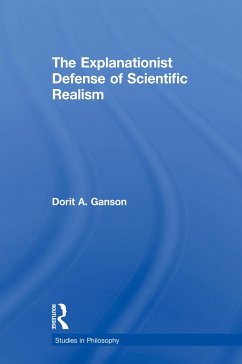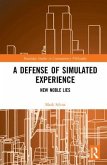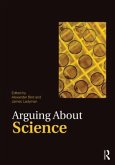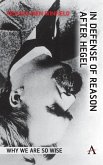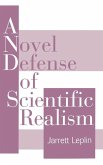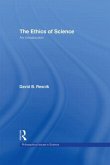Dorit A. Ganson
The Explanationist Defense of Scientific Realism
Dorit A. Ganson
The Explanationist Defense of Scientific Realism
- Gebundenes Buch
- Merkliste
- Auf die Merkliste
- Bewerten Bewerten
- Teilen
- Produkt teilen
- Produkterinnerung
- Produkterinnerung
Ganson offers new hope in this work for the defense of scientific realism by undermining powerful anti-realist objections and advocating an abandonment of naturalist and externalist strategies.
Andere Kunden interessierten sich auch für
![A Defense of Simulated Experience A Defense of Simulated Experience]() Mark SilcoxA Defense of Simulated Experience167,99 €
Mark SilcoxA Defense of Simulated Experience167,99 €![Mobilizing Traditions in the First Wave of the British Animal Defense Movement Mobilizing Traditions in the First Wave of the British Animal Defense Movement]() Chien-hui LiMobilizing Traditions in the First Wave of the British Animal Defense Movement98,99 €
Chien-hui LiMobilizing Traditions in the First Wave of the British Animal Defense Movement98,99 €![Arguing About Science Arguing About Science]() Arguing About Science74,99 €
Arguing About Science74,99 €![In Defense of Reason After Hegel In Defense of Reason After Hegel]() Richard Dien WinfieldIn Defense of Reason After Hegel129,99 €
Richard Dien WinfieldIn Defense of Reason After Hegel129,99 €![A Novel Defense of Scientific Realism A Novel Defense of Scientific Realism]() Jarrett LeplinA Novel Defense of Scientific Realism190,99 €
Jarrett LeplinA Novel Defense of Scientific Realism190,99 €![The Bounds of Defense The Bounds of Defense]() Bradley Jay StrawserThe Bounds of Defense87,99 €
Bradley Jay StrawserThe Bounds of Defense87,99 €![The Ethics of Science The Ethics of Science]() David B. ResnikThe Ethics of Science167,99 €
David B. ResnikThe Ethics of Science167,99 €-
-
-
Ganson offers new hope in this work for the defense of scientific realism by undermining powerful anti-realist objections and advocating an abandonment of naturalist and externalist strategies.
Produktdetails
- Produktdetails
- Verlag: Routledge
- Seitenzahl: 224
- Erscheinungstermin: 25. Januar 2001
- Englisch
- Abmessung: 235mm x 157mm x 18mm
- Gewicht: 521g
- ISBN-13: 9780815339649
- ISBN-10: 081533964X
- Artikelnr.: 21760298
- Herstellerkennzeichnung
- Libri GmbH
- Europaallee 1
- 36244 Bad Hersfeld
- gpsr@libri.de
- Verlag: Routledge
- Seitenzahl: 224
- Erscheinungstermin: 25. Januar 2001
- Englisch
- Abmessung: 235mm x 157mm x 18mm
- Gewicht: 521g
- ISBN-13: 9780815339649
- ISBN-10: 081533964X
- Artikelnr.: 21760298
- Herstellerkennzeichnung
- Libri GmbH
- Europaallee 1
- 36244 Bad Hersfeld
- gpsr@libri.de
Dorit A. Ganson is Assistant Professor of Philosophy at Oberlin College.
Preface
1. Introduction
I. Explanationism
I.i The Debate About Realism and the Constraints of Rationality
I.ii Versions of Explanationism/Realism
I.iii Externalist vs. Internalist Explanationist Approaches to Defending Realism
II. Miller's Internalist Explanationism
II.i Introducing Topic-Specific Truisms
II.ii The Role of Truisms in the Explanationist Defense of Realism
II.iii Why Truisms are Independent Marks of Rationality
III.iv Unfinished Business in Miller's Program
2. Acausal Models of Explanation
II.i Hume's Legacy and the Deductive-Nomological Model
II.ii From the Inductive-Statistical Model to the Statistical Relevance Approach
III. The Statistical Relevance Model of Explanation
III.i An Outline of the Model and some Refinements
III.ii The Requirement of Objective Homogeneity
III.iii Salmon's Acausal Criteria for Admissible Selection Rules and Ensuing Problems
III.iv Difficulties in the Identification of Causal Relevance with Statistical Relevance
3. Van Fraassen's Arguments Against Inference to the Best Explanation
I. Van Fraassen's Constructive Empiricism
II. Building a Case Against Explanationism: The Short Arguments
II.i The Scientific Image
II.ii Laws and Symmetry
III. The Bayesian Peter Objection
III.i Van Fraassen's Dutch Book Argument
III.ii Flaws in the Argument
III.iii Reconciling Explanationism with Bayes' Theorem
4. Van Fraassen's Dutch Books
I. A Philosophical Application of the Probability Calculus: Using Dutch Book Arguments to Derive Rationality Constraints
II. The Principle of Reflection
III. The Temporally Extended Principle of Reflection
IV. A Prohibition Against Assigning A Probability Value to some Special Conditional Propositions
5. Varieties of Explanationism and Fine's Critique
I. Smart's Wouldn't It be a Miracle? Argument
II. Boyd's Arguments for Realism
II.i Boyd's Inference to the Best Explanation
II.ii Rival Explanans and Explanandum
II.iii The Circularity Objection and the Realist Package
III. Naturalized vs. Non-naturalized Realism
6. The Transcendental Road to Realism
I. Fine's Criticisms of Miller's Realism
II. The True Source of Unreasonable Doubt
III. Why Taking on Isn't Good Enough
IV. Salvaging Realism about Molecules
Appendix
I. The Ralist Account of Broad Empirical Scope (and its Bayesian Justification)
II. Van Fraassen's UnBayesian Rejection of Broad Scope as an Epistemically Relevant Virtue
Works Cited
Index
1. Introduction
I. Explanationism
I.i The Debate About Realism and the Constraints of Rationality
I.ii Versions of Explanationism/Realism
I.iii Externalist vs. Internalist Explanationist Approaches to Defending Realism
II. Miller's Internalist Explanationism
II.i Introducing Topic-Specific Truisms
II.ii The Role of Truisms in the Explanationist Defense of Realism
II.iii Why Truisms are Independent Marks of Rationality
III.iv Unfinished Business in Miller's Program
2. Acausal Models of Explanation
II.i Hume's Legacy and the Deductive-Nomological Model
II.ii From the Inductive-Statistical Model to the Statistical Relevance Approach
III. The Statistical Relevance Model of Explanation
III.i An Outline of the Model and some Refinements
III.ii The Requirement of Objective Homogeneity
III.iii Salmon's Acausal Criteria for Admissible Selection Rules and Ensuing Problems
III.iv Difficulties in the Identification of Causal Relevance with Statistical Relevance
3. Van Fraassen's Arguments Against Inference to the Best Explanation
I. Van Fraassen's Constructive Empiricism
II. Building a Case Against Explanationism: The Short Arguments
II.i The Scientific Image
II.ii Laws and Symmetry
III. The Bayesian Peter Objection
III.i Van Fraassen's Dutch Book Argument
III.ii Flaws in the Argument
III.iii Reconciling Explanationism with Bayes' Theorem
4. Van Fraassen's Dutch Books
I. A Philosophical Application of the Probability Calculus: Using Dutch Book Arguments to Derive Rationality Constraints
II. The Principle of Reflection
III. The Temporally Extended Principle of Reflection
IV. A Prohibition Against Assigning A Probability Value to some Special Conditional Propositions
5. Varieties of Explanationism and Fine's Critique
I. Smart's Wouldn't It be a Miracle? Argument
II. Boyd's Arguments for Realism
II.i Boyd's Inference to the Best Explanation
II.ii Rival Explanans and Explanandum
II.iii The Circularity Objection and the Realist Package
III. Naturalized vs. Non-naturalized Realism
6. The Transcendental Road to Realism
I. Fine's Criticisms of Miller's Realism
II. The True Source of Unreasonable Doubt
III. Why Taking on Isn't Good Enough
IV. Salvaging Realism about Molecules
Appendix
I. The Ralist Account of Broad Empirical Scope (and its Bayesian Justification)
II. Van Fraassen's UnBayesian Rejection of Broad Scope as an Epistemically Relevant Virtue
Works Cited
Index
Preface
1. Introduction
I. Explanationism
I.i The Debate About Realism and the Constraints of Rationality
I.ii Versions of Explanationism/Realism
I.iii Externalist vs. Internalist Explanationist Approaches to Defending Realism
II. Miller's Internalist Explanationism
II.i Introducing Topic-Specific Truisms
II.ii The Role of Truisms in the Explanationist Defense of Realism
II.iii Why Truisms are Independent Marks of Rationality
III.iv Unfinished Business in Miller's Program
2. Acausal Models of Explanation
II.i Hume's Legacy and the Deductive-Nomological Model
II.ii From the Inductive-Statistical Model to the Statistical Relevance Approach
III. The Statistical Relevance Model of Explanation
III.i An Outline of the Model and some Refinements
III.ii The Requirement of Objective Homogeneity
III.iii Salmon's Acausal Criteria for Admissible Selection Rules and Ensuing Problems
III.iv Difficulties in the Identification of Causal Relevance with Statistical Relevance
3. Van Fraassen's Arguments Against Inference to the Best Explanation
I. Van Fraassen's Constructive Empiricism
II. Building a Case Against Explanationism: The Short Arguments
II.i The Scientific Image
II.ii Laws and Symmetry
III. The Bayesian Peter Objection
III.i Van Fraassen's Dutch Book Argument
III.ii Flaws in the Argument
III.iii Reconciling Explanationism with Bayes' Theorem
4. Van Fraassen's Dutch Books
I. A Philosophical Application of the Probability Calculus: Using Dutch Book Arguments to Derive Rationality Constraints
II. The Principle of Reflection
III. The Temporally Extended Principle of Reflection
IV. A Prohibition Against Assigning A Probability Value to some Special Conditional Propositions
5. Varieties of Explanationism and Fine's Critique
I. Smart's Wouldn't It be a Miracle? Argument
II. Boyd's Arguments for Realism
II.i Boyd's Inference to the Best Explanation
II.ii Rival Explanans and Explanandum
II.iii The Circularity Objection and the Realist Package
III. Naturalized vs. Non-naturalized Realism
6. The Transcendental Road to Realism
I. Fine's Criticisms of Miller's Realism
II. The True Source of Unreasonable Doubt
III. Why Taking on Isn't Good Enough
IV. Salvaging Realism about Molecules
Appendix
I. The Ralist Account of Broad Empirical Scope (and its Bayesian Justification)
II. Van Fraassen's UnBayesian Rejection of Broad Scope as an Epistemically Relevant Virtue
Works Cited
Index
1. Introduction
I. Explanationism
I.i The Debate About Realism and the Constraints of Rationality
I.ii Versions of Explanationism/Realism
I.iii Externalist vs. Internalist Explanationist Approaches to Defending Realism
II. Miller's Internalist Explanationism
II.i Introducing Topic-Specific Truisms
II.ii The Role of Truisms in the Explanationist Defense of Realism
II.iii Why Truisms are Independent Marks of Rationality
III.iv Unfinished Business in Miller's Program
2. Acausal Models of Explanation
II.i Hume's Legacy and the Deductive-Nomological Model
II.ii From the Inductive-Statistical Model to the Statistical Relevance Approach
III. The Statistical Relevance Model of Explanation
III.i An Outline of the Model and some Refinements
III.ii The Requirement of Objective Homogeneity
III.iii Salmon's Acausal Criteria for Admissible Selection Rules and Ensuing Problems
III.iv Difficulties in the Identification of Causal Relevance with Statistical Relevance
3. Van Fraassen's Arguments Against Inference to the Best Explanation
I. Van Fraassen's Constructive Empiricism
II. Building a Case Against Explanationism: The Short Arguments
II.i The Scientific Image
II.ii Laws and Symmetry
III. The Bayesian Peter Objection
III.i Van Fraassen's Dutch Book Argument
III.ii Flaws in the Argument
III.iii Reconciling Explanationism with Bayes' Theorem
4. Van Fraassen's Dutch Books
I. A Philosophical Application of the Probability Calculus: Using Dutch Book Arguments to Derive Rationality Constraints
II. The Principle of Reflection
III. The Temporally Extended Principle of Reflection
IV. A Prohibition Against Assigning A Probability Value to some Special Conditional Propositions
5. Varieties of Explanationism and Fine's Critique
I. Smart's Wouldn't It be a Miracle? Argument
II. Boyd's Arguments for Realism
II.i Boyd's Inference to the Best Explanation
II.ii Rival Explanans and Explanandum
II.iii The Circularity Objection and the Realist Package
III. Naturalized vs. Non-naturalized Realism
6. The Transcendental Road to Realism
I. Fine's Criticisms of Miller's Realism
II. The True Source of Unreasonable Doubt
III. Why Taking on Isn't Good Enough
IV. Salvaging Realism about Molecules
Appendix
I. The Ralist Account of Broad Empirical Scope (and its Bayesian Justification)
II. Van Fraassen's UnBayesian Rejection of Broad Scope as an Epistemically Relevant Virtue
Works Cited
Index

